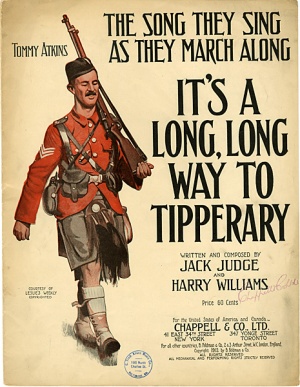 British Songs
British Songs
"It's a Long Way to Tipperary." Popular during the war, this British music hall song refers to Tipperary, a small town in Ireland far from the battles of the Great War. It's not a rousing let's-go-war song. Rather it's a song that longs for home.
It's a long way to Tipperary,
it's a long way to go.
It's a long way to Tipperary,
to the sweetest girl I know.
Good bye, Piccadilly,
Farewell Leicester Square.
It's a long long way to Tipperary,
but my heart's right there.
Along similar lines is "Keep the Home-Fires Burning ('Till the Boys Come Home)."
Keep the Home Fires Burning,
While your hearts are yearning.
Though your lads are far away
They dream of home.
There's a silver lining
Through the dark clouds shining,
Turn the dark cloud inside out
Till the boys come home.
"Pack All Your Troubles (In Your Old Kit Bag)" was written in 1915 and used to boost morale.
Pack up your troubles in y2our old kit bag,
And smile, smile, smile,
While you've a lucifer to light your fag,
Smile, boys, that's the style.
What's the use of worrying?
It never was worth while, so
Pack up your troubles in your old kit bag,
And smile, smile, smile.
French Songs
The most popular French song of the war was "La Madelon," a song of yearning for a young woman.
"Mademoiselle from Armentières" was a song popular with French troops in the 1830s. It became popular again, especially in America, during World War I. Below are the American lyrics:
The first Marine, he found the bean, parlez vous.
The second Marine, he cooked the bean, parlez vous.
The third Marine, he ate the bean and blew apart the submarine.
Inky dinky parlez vous.
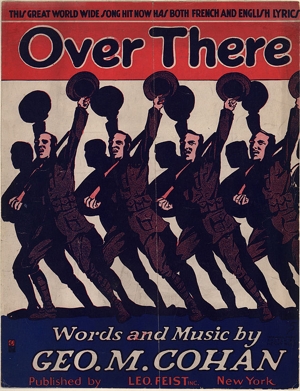 American Songs
American Songs
George M. Cohan and Irving Berlin, two of America's popular songwriters, wrote songs during the war.
"Over There" is one of Cohan's most famous songs. The cover for the song was illustrated by Norman Rockwell, who became famous later for his covers for the magazine The Saturday Evening Post.
Over there, over there,
Send the word, send the word over there
That the Yanks are coming, the Yanks are coming
The drums rum tumming everywhere.
So prepare, say a prayer,
Send the word, send the word to beware
We'll be over, we're coming over,
And we won't come back till it's over, over there.
Irving Berlin also composed a number of songs during the war.
He wrote "Oh! How I Hate to get up in the Morning" as a complaint about waking to reveille every morning, which he did after being drafted into Army.
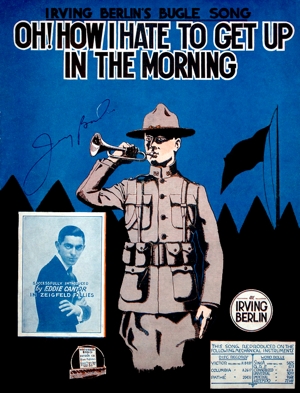 Oh! how I hate to get up in the morning,
Oh! how I hate to get up in the morning,
Oh! how I'd love to remain in bed;
For the hardest blow of all, is to hear the bugler call;
You've got to get up, you've got to get up
You've got to get up this morning!
Some day I'm going to murder the bugler,
Some day they're going to find him dead;
I'll amputate his reveille, and step upon it heavily,
And spend the rest of my life in bed.
The song spawned many parodies, describing life in the Army.
Another popular American song about military life was "You're in the Army Now."
You're in the Army now,
You're not behind a plow;
You'll never get rich,
Digging a ditch,
You're in the Army now.
Another popular song, "How Ya Gonna Keep 'em Down on the Farm (After They've Seen Paree)?," reflected a real social concern in American life, as after the war, more Americans began migrating to cities.
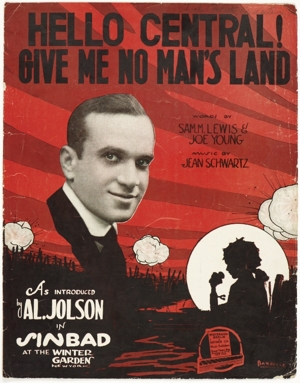 "Hello Central, Give Me No Man's Land" tells about a child, whose father has been killed in the trenches of the war, who uses the telephone to call him. The song was made popular by Al Jolson, an entertainer of the era, in the play Sinbad.
"Hello Central, Give Me No Man's Land" tells about a child, whose father has been killed in the trenches of the war, who uses the telephone to call him. The song was made popular by Al Jolson, an entertainer of the era, in the play Sinbad.
Hello Central, give me no man's land
My Daddy's there, my Mama told me
She tiptoed off to bed, after my prayers were said
Don't ring when you get my number, or you'll disturb Mama's slumber
I'm afraid to stand here at the phone, >cause I'm alone,
So won't you hurry
I want to know why Mama starts to weep, when I say, "Now I lay me down to sleep"
Hello Central, give me no man's land
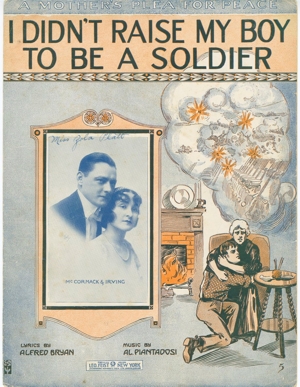
Before America entered the war in 1917, quite a few songs opposed going to war. The most popular song was "I Didn't Raise My Boy to Be a Soldier."
I didn't raise my boy to be a soldier,
I brought him up to be my pride and joy.
Who dares to place a musket on his shoulder,
To shoot some other mother's darling boy?
Let nations arbitrate their future troubles,
It's time to lay the sword and gun away.
There'd be no war today,
If mothers all would say,
"I didn't raise my boy to be a soldier."
{/tab}

 British Songs
British Songs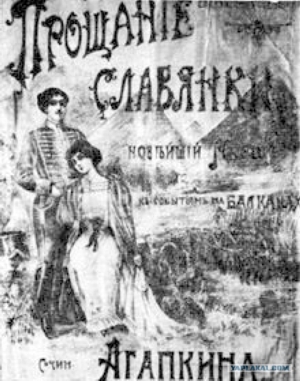 "Slavic Woman's Farewell"
"Slavic Woman's Farewell" American Songs
American Songs Oh! how I hate to get up in the morning,
Oh! how I hate to get up in the morning, "Hello Central, Give Me No Man's Land" tells about a child, whose father has been killed in the trenches of the war, who uses the telephone to call him. The song was made popular by Al Jolson, an entertainer of the era, in the play Sinbad.
"Hello Central, Give Me No Man's Land" tells about a child, whose father has been killed in the trenches of the war, who uses the telephone to call him. The song was made popular by Al Jolson, an entertainer of the era, in the play Sinbad.
